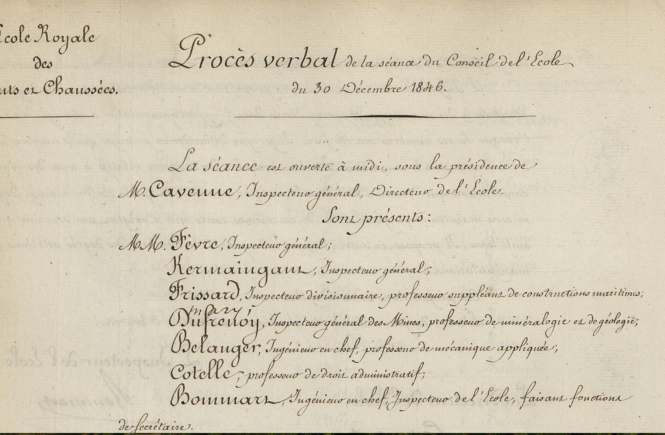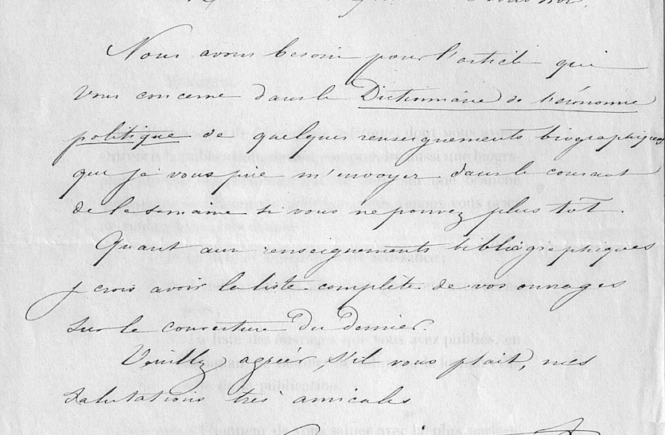1846 — THE CLOSE MONITORING OF JOSEPH GARNIER’S LESSONS ON POLITICAL ECONOMY.
Minutes of two meetings of the council
of the École des Ponts et Chaussées
[Archives de l’École nationale des Ponts et Chaussées, 9562-02.
Registre des procès-verbaux des séances du Conseil de l’École.]
[30 December 1846.] The meeting isopened at 12:00 and chaired by Mr. Cavenne, general inspector, director of the school.
Are present:
Mr. Fèvre, general inspector;
Mr. Kermaingans, general inspector;
Mr. Frissard, divisional inspector, substitute professor of marine installations and works;
Mr. Dufrenoy, inspector general of mines, professor of mineralogy and geology;
Mr. Belanger, chief engineer, professor of applied mechanics;
Mr. Cotelle, professor of administrative law;
Mr. Boummars, chief engineer, inspector of the school, acting as secretary.
The minutes of the 27 November meeting are read out and adopted.
Three letters from the Under-Secretary of State are read out.
In the first of these letters, dated 1 December, the Under-Secretary of State informs the Director of the School that the requirements of the service having placed the administration in the need to give in advance a final destination to eight students who had originally been placed on a provisional basis in the arrondissements, these students, Mr. Grimmeo, Leferme, Marx, Puquière, Bertin, Gardieu, Darcel and Bernard, will not return to school and must be registered on the controls as first class pupils out of competition, from 1 December 1846 onwards.
In the second one, dated 8 December, the Under-Secretary of State informed the Director that, according to the desire expressed on several occasions by the School Council, the Minister of Public Works has just decided that political economy lessons will be given at the École des Ponts et Chaussées during the 1847 session; that Mr. Joseph Garnier, a young economist, author of some publications well appreciated by the public, was appointed to give these lessons, and that consequently Mr. Garnier was invited to write a program which will be definitively adopted by the administration after being submitted to the School Council for prior consideration.
In the third letter, dated 23 December, the Under-Secretary of State forwards to the Director the program that was sent to him by Mr. Garnier and invites him to immediately submit this program to the Council for consideration.
The Director announces that the special purpose of this meeting is the review of the program written by Mr. Garnier.
This program is read out.
Several members point out that the text which has just been read, mentioning only the titles of the divisions and subdivisions of the lessons in Political Economy, without any indication of the spirit in which the various questions shall be treated, and therefore opening a way for developments in the most different systems, it is impossible for the Council to pass at this time any clear and informed judgment. These members believe that in this situation it is appropriate to show confidence and accept this program for now, while giving the Council the right and the duty to examine at the end of the session, upon the account which will be given of the lessons which will have been taught, if modifications will need to be introduced in the program of the lessons of political economy to be adopted subsequently.
This proposal was met with general support.
The Council is therefore of the opinion that the program written by Mr. Garnier can be accepted; provided, however, that the lessons to be given on the topics of this program will be developed with great caution, and in such a way that, in all controversial questions, the facts alone will be presented in an affirmative form, and that the arguments in favor of the various systems will be exposed impartially, to the exclusion of any formal conclusion which common opinion has not definitively sanctioned.
On the proposal of the Director, the Council then decides that for the time being the first part of the lessons, including the explanation of the general principles of political economy, shall be followed simultaneously by the pupils of the 1st and the 2nd class; and that the second part, devoted mainly to the application of these principles to public works questions, will be compulsory for 1st class students only.
In accordance with Mr. Garnier’s forecast and with the School Inspector’s proposals, there will be two lessons per week until the end of the session.
The agenda having been exhausted, the meeting is closed at 1.30 pm.
The School Director. The School Inspector.
Signed Cavenne Signed Boummars
[9 March 1847.] The meeting is opened at 11:00 a.m. and chaired by Mr. Cavenne, general inspector, director of the school
Are present:
Mr. Fèvre, general inspector;
Mr. Frissard, divisional inspector, substitute professor of marine installations and works;
Mr. Mary, chief engineer, professor of construction work;
Mr. Belanger, chief engineer, professor of applied mechanics;
Mr. Reynaud, chief engineer, substitute professor of architecture;
Mr. Boummars, chief engineer, inspector of the school, acting as secretary.
The minutes of the 30 December meeting are read out and adopted.
Two letters from the Under-Secretary of State, both dated 12 January, are read out.
In the first, the Under-Secretary of State approves the proposals made by the Council, in the meeting of 27 November 1846, to introduce various changes in the scale of degrees;
In the second, he decides, in accordance with the proposals made by the Council in the meeting of 30 December, 1 °. that the first part of the lessons on Political Economy, including the exposition of the general principles of this science, will be followed simultaneously by the pupils of 1st and 2nd class; and that the second part, which mainly concerns the application of these principles to public works questions, will be compulsory for 1st class pupils only; 2 °. that there will be two lessons per week until the end of the session.
Upon reading this second letter, the Director informs the Board that he assiduously followed the lessons of Mr. Garnier and that he recognized that despite the efforts made by the professor to comply with the recommendations addressed to him about a strict circumspection in dealing with controversial issues, his sympathy to laissez-faire and laissez-passer principles and free trade doctrines, are all too clear and pierce, almost in spite of him, in all parts of his teaching. — The Director adds that with regard to the second part of the lessons, dealing with applications to public works, Mr. Garnier came to explain to him that not only was he not in a position to teach this part of his teaching this year, but that the present state of his studies did not allow him to write its program; and that he asked him for guidance in this regard. After having come to an understanding with the Inspector of the School, the Director invited Mr. Garnier to examine whether he could adopt the program of the School of Civil engineering in Gand for the year 1837, while keeping the possibility of later modifications and additions; and at the same time he informed him that he would submit to the Council and the Under-Secretary of State the proposal to refrain, for this session at least, from giving the part of the course dealing with applications.
The Council recognizes that, as it stands, there is no other course to be taken; and that therefore the lessons will be completed when the teacher will have first finished the exposition of theoretical principles…
The meeting is closed at 1:00 pm.
The School Director. The School Inspector.
Signed Cavenne Signed Boummars


